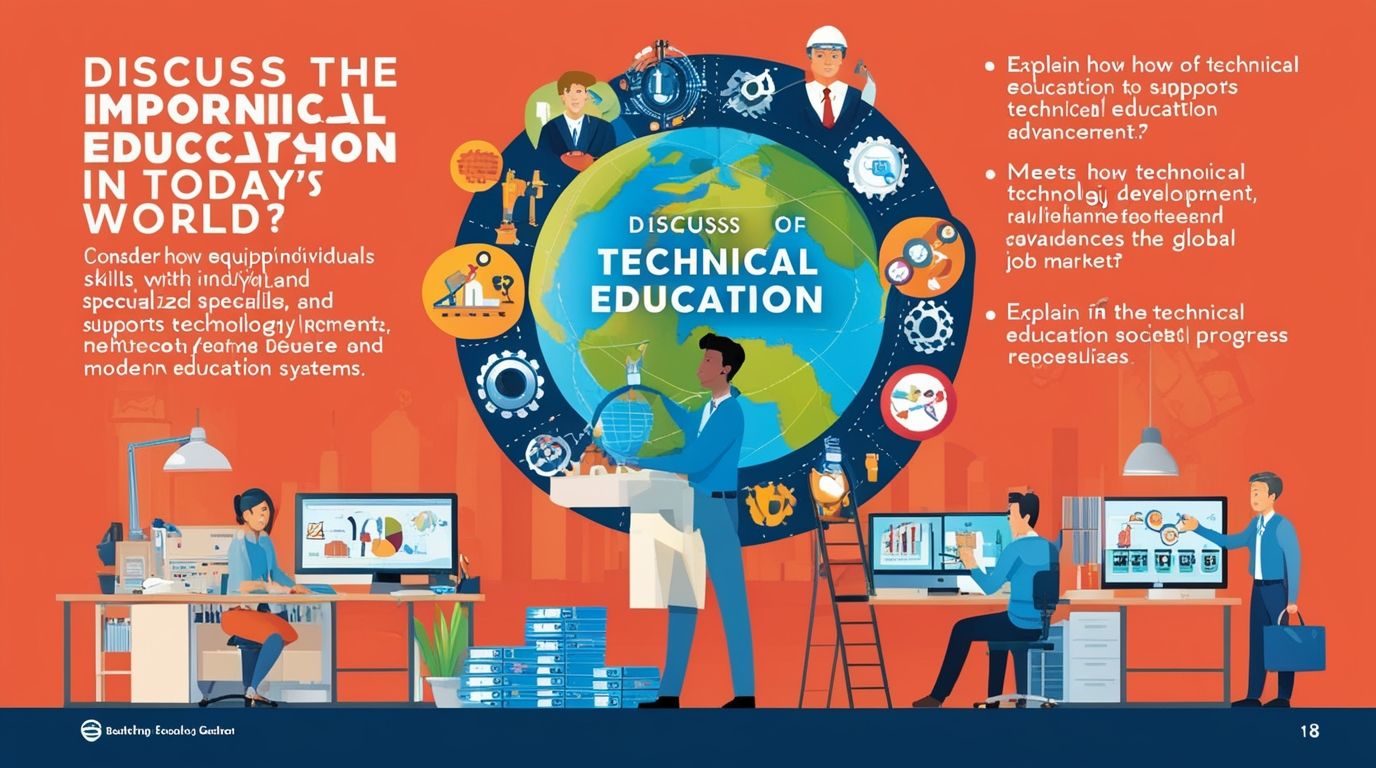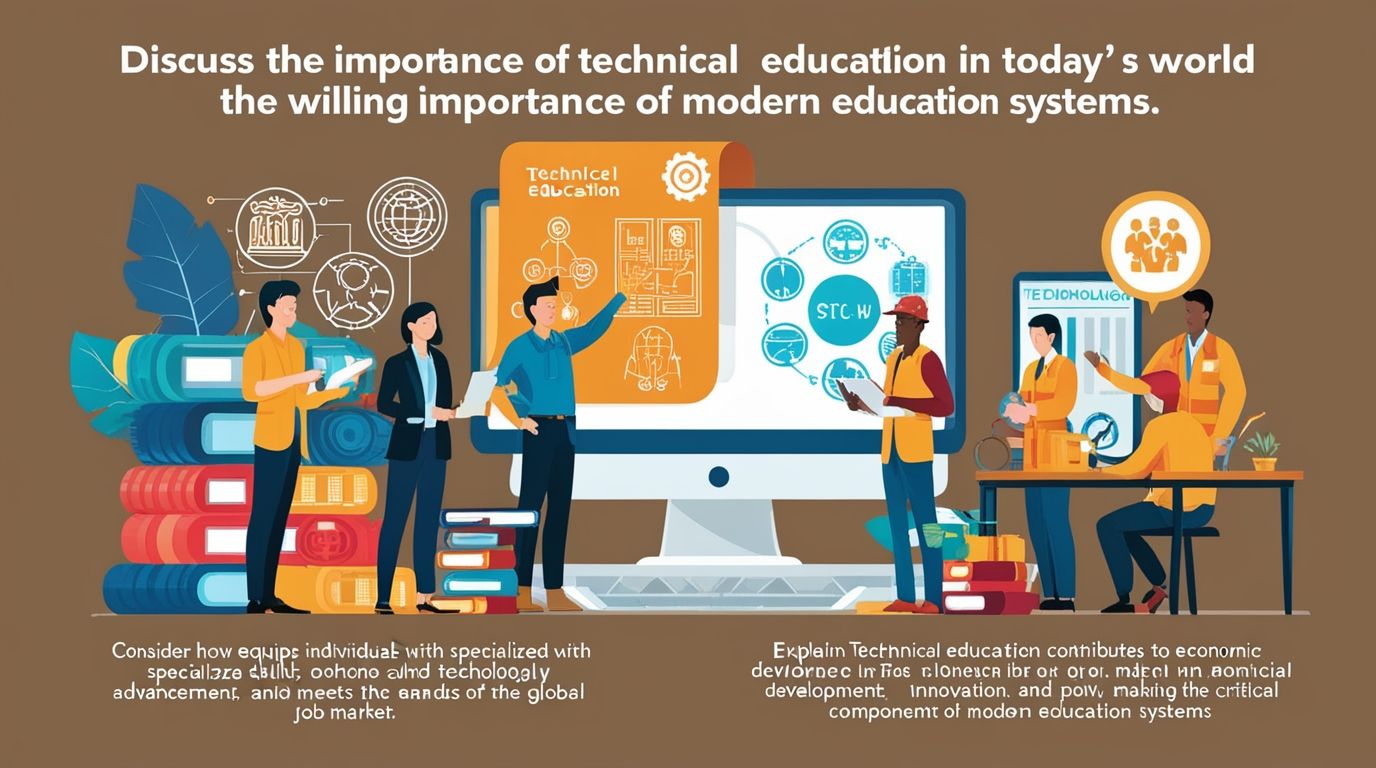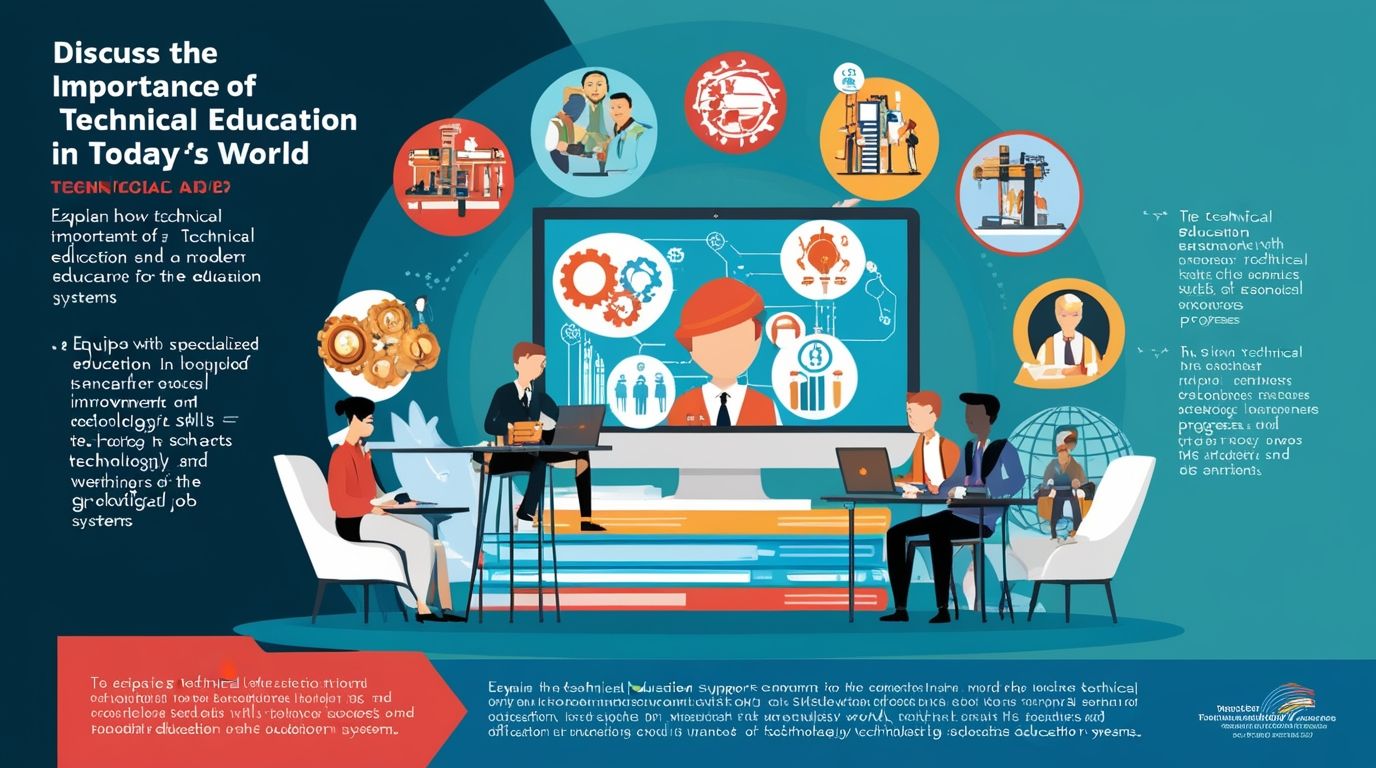Introduction
The Importance of Technical Education in the Modern World in an era marked by rapid technological advancement and globalization, technical education has emerged as a critical component of modern education systems. As economies increasingly rely on technology-driven industries, the demand for a workforce skilled in technical disciplines has grown exponentially. Technical education, which focuses on imparting practical skills and knowledge in fields such as engineering, information technology, healthcare, and vocational trades, equips individuals with the expertise needed to thrive in the modern workforce. This article explores the significance of technical education in the contemporary world, highlighting its role in economic development, employment generation, and personal growth.
The Role of Technical Education in Economic Development
- Driving Innovation and Industrial Growth: Technical education is a key driver of innovation and industrial growth. As industries become more reliant on advanced technologies, there is a growing need for professionals who can design, implement, and maintain these technologies. Technical education provides the foundational knowledge and skills required to drive innovation, from developing new software and manufacturing processes to advancing medical technologies and renewable energy solutions. By fostering a workforce capable of pushing the boundaries of technological innovation, technical education contributes to the growth and competitiveness of industries, ultimately boosting economic development.
- Enhancing Productivity and Efficiency: Technical education plays a crucial role in enhancing productivity and efficiency within industries. Skilled technicians, engineers, and IT professionals are essential for optimizing processes, reducing waste, and improving the quality of products and services. For example, in manufacturing, technical education enables workers to operate complex machinery, troubleshoot issues, and implement lean manufacturing techniques. In the IT sector, technical education equips professionals with the skills to develop software solutions, manage networks, and ensure cybersecurity. By enhancing productivity and efficiency, technical education contributes to the overall economic performance of industries and nations.
- Supporting Economic Diversification: Technical education is instrumental in supporting economic diversification, particularly in developing countries. Many economies are heavily reliant on a limited number of industries, such as agriculture or natural resource extraction. By promoting technical education in diverse fields, such as information technology, renewable energy, and healthcare, countries can reduce their dependence on traditional industries and create new economic opportunities. This diversification not only strengthens the resilience of economies but also provides individuals with a broader range of career options.

Employment Generation and Workforce Development
- Meeting the Demand for Skilled Workers: The modern economy is increasingly driven by sectors that require specialized technical skills. Industries such as information technology, healthcare, manufacturing, and construction are experiencing a growing demand for skilled workers who can operate advanced technologies, design innovative solutions, and provide specialized services. Technical education is essential for meeting this demand by preparing individuals with the expertise needed to fill these roles. As a result, technical education contributes to reducing unemployment and underemployment by aligning the skills of the workforce with the needs of the labor market.
- Providing Pathways to High-Paying Jobs: Technical education offers pathways to high-paying jobs, particularly in industries where there is a shortage of skilled workers. For example, careers in software development, cybersecurity, engineering, and healthcare often offer competitive salaries and benefits. Technical education programs, such as vocational training, apprenticeships, and technical degrees, provide individuals with the qualifications needed to access these lucrative job opportunities. Moreover, technical education often requires less time and financial investment than traditional four-year degree programs, making it an attractive option for individuals seeking to enter the workforce quickly and with minimal debt.
- Supporting Lifelong Learning and Career Advancement: In the modern world, the concept of lifelong learning has become increasingly important. As technology evolves and industries change, workers must continuously update their skills to remain competitive in the job market. Technical education plays a vital role in supporting lifelong learning by offering opportunities for individuals to acquire new skills, earn certifications, and pursue advanced technical training. This continuous learning enables workers to advance in their careers, transition to new roles, and adapt to changing industry demands.
The Impact of Technical Education on Society
- Empowering Individuals and Communities: Technical education has the power to transform lives by providing individuals with the skills and knowledge needed to secure stable, well-paying jobs. This empowerment extends to communities, as access to technical education can lead to increased economic mobility, reduced poverty, and improved quality of life. For example, in rural or underserved areas, technical education programs can provide residents with the skills needed to access employment opportunities in growing industries, such as renewable energy or telecommunication. By empowering individuals and communities, technical education contributes to social equity and economic inclusion.
- Addressing Global Challenges: The modern world faces a range of complex challenges, from climate change and healthcare access to cybersecurity threats and infrastructure development. Technical education is essential for developing the expertise needed to address these challenges. For instance, engineers and environmental scientists trained through technical education programs play a crucial role in developing sustainable technologies and infrastructure. Healthcare professionals with specialized technical training are on the front lines of improving global health outcomes. By equipping individuals with the skills needed to tackle global challenges, technical education contributes to the betterment of society as a whole.
- Promoting Gender Equality in the Workforce: Technical education has the potential to promote gender equality in the workforce by encouraging the participation of women in traditionally male-dominated fields, such as engineering, information technology, and skilled trades. Despite progress in recent years, women remain underrepresented in many technical professions. By providing targeted outreach, scholarships, and support programs, technical education institutions can help close the gender gap in these fields. Increased gender diversity in technical professions not only enhances innovation and creativity but also ensures that the benefits of economic growth are more equitably distributed.

The Evolution of Technical Education in the Digital Age
- Integration of Digital Technologies in Education: The digital age has transformed the way technical education is delivered and accessed. The integration of digital technologies, such as online learning platforms, virtual labs, and simulations, has expanded the reach and flexibility of technical education programs. Students can now access high-quality technical education from anywhere in the world, often at a lower cost than traditional in-person programs. This accessibility has opened up new opportunities for individuals who may have previously faced barriers to technical education, such as geographic location or financial constraints.
- The Role of Industry Partnerships in Technical Education: Industry partnerships are increasingly shaping the landscape of technical education. Collaboration between educational institutions and industry partners ensures that technical education programs are aligned with the current needs of the labor market. These partnerships often involve internships, apprenticeships, and co-op programs that provide students with hands-on experience and direct exposure to industry practices. Additionally, industry partners may provide input on curriculum development, ensuring that graduates possess the skills and knowledge required by employers. This close collaboration between education and industry enhances the relevance and effectiveness of technical education.
- Adapting to the Future of Work: As the nature of work continues to evolve, technical education must adapt to prepare individuals for the future. Emerging technologies, such as artificial intelligence, robotics, and the Internet of Things, are reshaping industries and creating new job roles. Technical education programs must stay ahead of these trends by incorporating cutting-edge technologies and providing training in new and emerging fields. For example, programs focused on data science, cybersecurity, and renewable energy are becoming increasingly important as these fields grow in significance. By anticipating and responding to changes in the job market, technical education ensures that the workforce remains prepared for the challenges of the future.
Challenges and Solutions in Technical Education
- Addressing the Skills Gap: Despite the importance of technical education, many industries continue to face a skills gap, with a shortage of qualified workers to fill technical roles. Addressing this gap requires a multi-faceted approach, including expanding access to technical education, enhancing career guidance, and promoting the value of technical careers to students and parents. Governments, educational institutions, and industry partners must work together to ensure that technical education programs are widely available and aligned with labor market needs.
- Ensuring Quality and Relevance: The quality and relevance of technical education programs are critical to their success. Educational institutions must continuously update their curricula to reflect advancements in technology and industry practices. Accreditation and certification bodies play a key role in maintaining high standards and ensuring that technical education programs meet the needs of employers. Additionally, investing in faculty development and providing educators with ongoing training is essential for maintaining the quality of technical education.
- Overcoming Social and Cultural Barriers: In some cultures, technical education is perceived as less prestigious than academic education, leading to lower enrollment in technical programs. Overcoming this stigma requires changing societal attitudes and highlighting the value of technical careers. Public awareness campaigns, success stories, and role models can help shift perceptions and encourage more students to pursue technical education. Additionally, offering pathways for further education, such as the opportunity to transition from technical programs to higher education degrees, can enhance the appeal of technical education.
Conclusion
Technical education is of paramount importance in the modern world, serving as a cornerstone for economic development, employment generation, and social progress. By equipping individuals with the skills and knowledge needed to thrive in technology-driven industries, technical education fosters innovation, enhances productivity, and supports economic diversification. Moreover, technical education empowers individuals and communities, addresses global challenges, and promotes gender equality in the workforce.
As the digital age continues to reshape the world of work, technical education must evolve to meet the demands of the future. By integrating digital technologies, fostering industry partnerships, and adapting to emerging trends, technical education will remain a vital component of modern education systems. To fully realize its potential, stakeholders must address challenges such as the skills gap, quality assurance, and social barriers, ensuring that technical education is accessible, relevant, and valued by all.
In conclusion, the importance of technical education in the modern world cannot be overstated. It is a powerful tool for personal and professional growth, a driver of economic prosperity, and a force for positive social change. As we move forward, investing in and prioritizing technical education will be essential for building a skilled, innovative, and resilient workforce capable of meeting the challenges of the 21st

Hello my family member! I want to say that this article is awesome, nice written and include almost all significant infos. I’d like to see more posts like this.
Pretty! This was a really wonderful post. Thank you for your provided information.
vneb8a
4pa1pj
As soon as I discovered this web site I went on reddit to share some of the love with them.
ks5dlp
Terrific work! This is the type of information that should be shared around the internet. Shame on the search engines for not positioning this post higher! Come on over and visit my web site . Thanks =)
99exsn
rqfkbb
Wake up your way with this premium CD player alarm clock radio. Whether you prefer to rise with the AM/FM radio, your favorite CD, or a standard buzzer, this versatile alarm clock with CD player has you covered. Its intuitive design includes dual alarms, a large digital display, snooze/sleep timers, and USB charging for your phone. Enjoy high-quality stereo sound from a compact unit that fits easily on any bedside table or shelf. The best clock radios with CD player combine retro functionality with modern convenience—and this one leads the pack.
I do agree with all of the ideas you have presented in your post. They are very convincing and will definitely work. Still, the posts are too short for beginners. Could you please extend them a bit from next time? Thanks for the post.
I have been exploring for a bit for any high-quality articles or weblog posts in this sort of house . Exploring in Yahoo I eventually stumbled upon this web site. Reading this info So i am happy to exhibit that I’ve a very just right uncanny feeling I found out just what I needed. I such a lot certainly will make certain to do not overlook this web site and provides it a look on a continuing basis.
Hi there, You’ve done a great job. I will certainly digg it and personally recommend to my friends. I’m sure they will be benefited from this website.
I like this web blog very much so much great info .
Greetings! I’ve been following your web site for a long time now and finally got the bravery to go ahead and give you a shout out from Humble Tx! Just wanted to say keep up the fantastic job!
I know this if off topic but I’m looking into starting my own weblog and was wondering what all is needed to get setup? I’m assuming having a blog like yours would cost a pretty penny? I’m not very internet savvy so I’m not 100 sure. Any suggestions or advice would be greatly appreciated. Thanks
I precisely had to say thanks yet again. I am not sure the things that I would have done in the absence of the actual hints shown by you relating to my field. It truly was a very frustrating circumstance in my opinion, however , looking at a well-written strategy you processed that made me to cry for fulfillment. I’m just grateful for this assistance as well as trust you comprehend what an amazing job you were carrying out instructing other individuals via your website. I am certain you have never got to know any of us.
Hiya, I’m really glad I’ve found this info. Nowadays bloggers publish just about gossips and internet and this is really irritating. A good blog with exciting content, this is what I need. Thanks for keeping this website, I’ll be visiting it. Do you do newsletters? Can’t find it.
You are my intake, I possess few blogs and often run out from to post .
I haven’t checked in here for a while because I thought it was getting boring, but the last few posts are good quality so I guess I will add you back to my daily bloglist. You deserve it my friend 🙂
Oh my goodness! an incredible article dude. Thanks However I am experiencing concern with ur rss . Don’t know why Unable to subscribe to it. Is there anybody getting identical rss downside? Anybody who knows kindly respond. Thnkx
I believe that is among the so much vital info for me. And i am happy studying your article. But want to commentary on few general issues, The website taste is great, the articles is in point of fact excellent : D. Good process, cheers
Hey there! Would you mind if I share your blog with my zynga group? There’s a lot of people that I think would really appreciate your content. Please let me know. Many thanks
The very core of your writing while sounding agreeable in the beginning, did not sit very well with me personally after some time. Someplace within the sentences you were able to make me a believer but just for a short while. I nevertheless have a problem with your jumps in logic and one would do well to help fill in all those breaks. When you can accomplish that, I would certainly end up being fascinated.
Have you ever considered about adding a little bit more than just your articles? I mean, what you say is fundamental and all. Nevertheless imagine if you added some great graphics or video clips to give your posts more, “pop”! Your content is excellent but with pics and video clips, this website could definitely be one of the very best in its field. Very good blog!
I’ll immediately grab your rss as I can not find your email subscription link or newsletter service. Do you’ve any? Kindly let me know so that I could subscribe. Thanks.
Hello! Someone in my Facebook group shared this website with us so I came to look it over. I’m definitely loving the information. I’m bookmarking and will be tweeting this to my followers! Exceptional blog and excellent design.
Very great info can be found on website.
I do like the manner in which you have presented this particular concern and it really does supply us some fodder for consideration. Nevertheless, from what precisely I have witnessed, I just simply wish when the comments stack on that people keep on issue and in no way get started on a tirade associated with the news du jour. All the same, thank you for this excellent point and whilst I can not concur with the idea in totality, I respect your viewpoint.
I?¦ve recently started a site, the information you offer on this site has helped me greatly. Thanks for all of your time & work.
I’d constantly want to be update on new articles on this web site, saved to my bookmarks! .
Very interesting info !Perfect just what I was looking for! “Charity is injurious unless it helps the recipient to become independent of it.” by John Davidson Rockefeller, Sr..
Great – I should certainly pronounce, impressed with your website. I had no trouble navigating through all the tabs and related information ended up being truly easy to do to access. I recently found what I hoped for before you know it in the least. Reasonably unusual. Is likely to appreciate it for those who add forums or something, website theme . a tones way for your customer to communicate. Excellent task..
**finessa**
Finessa is a natural supplement made to support healthy digestion, improve metabolism, and help you achieve a flatter belly.